My father, William John Challis, Jack, was the most honourable of men. He lived his life in the most authentic way – always true to his values and his beliefs. He was a man, less of words and more of purposeful action.
Dad was honest, authentic, loyal, trustworthy, reliable, stoic, wry witted and generous. His work ethic purposeful; he believed in thoroughness and seeing things through to the end.
Telling any story about Dad reflects these qualities because he didn’t talk them, he walked them; he lived them.
Born in Glenn Innes in 1924, Dad was the first born of two sons to Bill and Helen (nee Martin) Challis. Born in the old hospital which is now a museum. He grew up in a community of farmers, growers and orchardists.
His Dad – a returned soldier from the first world war, along with many others who came from farming backgrounds, were granted land in a returned soldier’s settlement. The settlement was divided up into orchards up and down the New England Highway at a place called Kentucky half an hour south of Armadale. Dad tells us that they all battled, and it was very hard. His father ill for a long time after the war, also ran the local packing shed. In talking about his upbringing and what he remembers of his father, Jack would cite proudly how years later when they lived in Gosford, his Dad Bill was called to run the Gosford packing shed which had fallen in to receivership. Bill became a local hero to the growers and workers in that area as he was not only able to steer it out of receivership, but also restore it to even greater profitability.
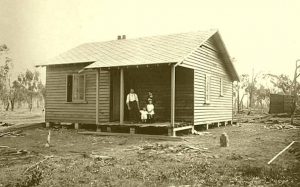
Jack would often talk about the packing sheds – and one can only now imagine how central these places were to a community of growers whose entire livelihood depended on selling their produce. Fruit was the settlers’ primary source of income and they also relied on cash crops of vegetables, especially in the several years before the fruit trees became productive. The Armadale Express of April 4, 1922, proudly reported: “The fruit trees at Kentucky are just coming into bearing and specimens of apples and pears can be seen in the windows of Greengrocers Anderson & Co, George Street, Sydney.”
Reflecting on this part of Jack’s history gives us insight into the origin and instilling of his values and beliefs. As hard as times were for Bill and Helen raising two boys on the living derived from farming, they were generous to a fault and along with a scholarship were able to send him to TAS Armadale school, which no doubt fortified and nourished the man he was to become. He often spoke of TAS with deep appreciation and affection. And today in reading the core philosophy of TAS being ’the firm belief that education is about the holistic development of character and willingness to engage in life, running parallel to, the pursuit of academic achievement and effort.’ Confirms the character of my father as one who did pursue achievement through effort; thoroughly until the job was done. Along with his academic achievements he also succeeded at sport. He loved his sport and from the age of 15 played in the 1st 11 Cricket team and first 15 rugby ultimately captaining the side. Jack was also an incredible athlete and won the 400-yard race at GPS in his last year at school.
No doubt Dad had many great experiences at TAS including forming a lifelong friendship with Bill Coghlan who he went on to fly 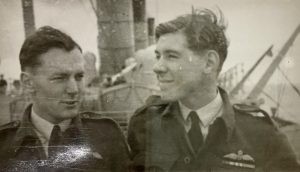 with in the Air Force in the war in England. Once you made a friend of Jack you had a friend for life – loyal and true. One of the joyful moments for us looking through the old photographs was seeing these two mates in one another’s company – evidence of the friendship and loyalty and also the sheer enjoyment of the deep entrusted bonds of mate-ship.
with in the Air Force in the war in England. Once you made a friend of Jack you had a friend for life – loyal and true. One of the joyful moments for us looking through the old photographs was seeing these two mates in one another’s company – evidence of the friendship and loyalty and also the sheer enjoyment of the deep entrusted bonds of mate-ship.
In each chapter of Jack’s life, you see evidence of the expression of his love and his sense of service, to his family, his community and his country. He tells the story of finishing his race at the GPS sports event and running to enlist in the Australian Air Force. Once he was enlisted and had to work hard to achieve his certificates of qualifications as ‘first pilot’; his first certificate achieved on the 14th of July 1943 in an Airspeed Oxford – The Oxford (nicknamed the ‘Ox-box’) was used to prepare aircrews.
Before he earned and received his wings in Australia, he started at Bradfield Park – the suburb now known as Lindfield in Sydney – there he was prepared for military life and was taught subjects such as mathematics, navigation and aerodynamics. For him, this was considered as doing the ground work, then going on to an air base at Tamora Air Field an hour north of Wagga Wagga where he first soloed on April the 25th 1943 on a DH.82 Tiger Moth. Further training took him to Point Cook in Victoria flying the Airspeed Oxford. Dad recalls one event practicing night flying at Point Cook – Circuit and bumps at 1000 feet – where he would fly around in a circuit, land and take off immediately, he recalls a time one night when the fog came in, he was completely blind – and after a nervous few minutes to his great relief got a glimpse of the runway lights and was able to land – he sh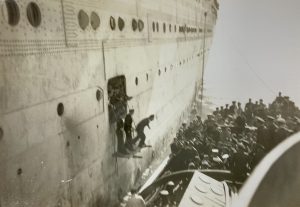 ared: ‘imagine flying around with no contact or way of contacting the ground – glad to get down – often thought about that’. In fact, Dad often reminisced on the fact that he had been ‘looked after’ several times in his military service career.
ared: ‘imagine flying around with no contact or way of contacting the ground – glad to get down – often thought about that’. In fact, Dad often reminisced on the fact that he had been ‘looked after’ several times in his military service career.
He tells the story of sailing across the Pacific on the Mariposa headed for San Francisco and one day the Mariposa swerved to avoid a Japanese submarine. On first arriving in America he recalls birthing at Port Slocomb and then catching the train in cramped conditions across the states to New York. He shared that as a young man of 19 he was awed by New York – his comment – there I was, never been out of nappies. He also recalled before sailing to England how much he enjoyed meeting a lovely lady who took him horse riding in Central Park. Assuring me quite clearly, they were just good friends – and I’m sure that he meant what he said. Sailing across the Atlantic once more meant the risk of being attacked. The Queen Mary from New York to England took an extra time couple of days going 300 miles out of the way to avoid a pack of submarines. His berth on the ship was absolutely packed – 8 men tucked into a small area. He did fondly remember drinking his first cup of tea on the Queen Mary – a huge relief for him after all that American coffee.
In England he was stationed at several Air Bases, including Morton on Green south of London. In his time in England he flew Airspeed Oxfords and in April 45 soloed on a Harvard Mk II known as “the pilot maker” because of its important role in preparing pilots for combat. This prepared him for his first solo on a Hurricane and then later the Supermarine Spitfire famed for its role in the Battle of Britain earlier in the war. Dad went on to fly other craft including the Bristol Beaufighter and the Tempest. His last station being Bradwell Bay an hour and half east of London.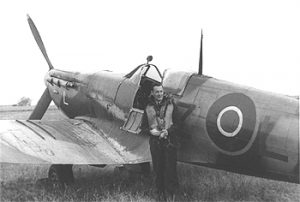
Dad did not speak much of his war service however one story did reveal his vulnerability – which for Jack, was rare: He shared: “When we first went to England we lived in the Nissen hut with a Lancaster Bomber crew and we would often go into London to the pubs. On one particular night we went out and it was as if the crew knew they weren’t coming back – and they didn’t. That night I was all alone in the hut when a chap came to tell me that the crew weren’t coming back. It was the most scared I have ever been in my life. Lying there, thinking of what was to come. Most scared time in my life and then in the morning it was the next day and we just got on with it.”
I love this story for two reasons – one because it is a small window into the emotional experience of my Dad when he was 19 and also because of the sheer pragmatism it speaks to – in the morning we just got on with it. And he did.
On returning to Australia after being discharged on the 18th of Jan 1946 with a France and Germany Star and a 39-45 Star dad certainly got on with it. While he was overseas his father sadly passed away. He recalls that when he returned from the war – he had no experience and no money – and yet immediately was called upon to support his mother and younger brother, now living in Gosford. He just got on with it.
He first worked on a farm for a Mr. Pring – he rode his bike from Gosford to a place called ‘Narara’ up and down many hills – he recalled that he never walked up one of them – he would ride to work, work all day, ride home and then work in the garden when he got home. There I was on my bike – he would say – I could fly a plane but didn’t know how to drive a car. All this of course speaks to the way he expressed his love and duty in the service for others.
Some time passed and when three blocks at Somersby – some 20 kilometers west of Gosford, became available by someone who would only sell to returned service men, Dad and his mum Helen purchased one. They had some funds and were able to apply to the CRTS – Commonwealth Reconstruction Training Scheme, for assistance. We had some income and Mum got something from the packing shed legacy. The block of land to be named ‘Ardlair’ was virgin bush – not only did Jack have to clear the land to make garden beds for cropping he had to build a home. To do this he sourced and dismantled a sergeant’s mess at Homebush. He brought it back on a truck in pieces with a man called Mr. Simms.
He shared with us: Mum bought the mess for 100 pounds – it was 80 squares – 60 by 30 – 65 year old Mr. Simms and I went down to dismantle the mess – fibro walls, fibro roofing and cyprus flooring which we cut into sections – you couldn’t get any materials in those days at the end of the war – everything was scarce – we dumped it onto the block where we could and started to reassemble it – I had 10 pounds to buy some tools – tape – square – saw – hammer etc. – we dug the piers and put it back the same size and it also had a verandah – holes had to be dug and we used sump oil to protect them from white ants – we put it all back as it was – 4 bedrooms with a hall up the centre.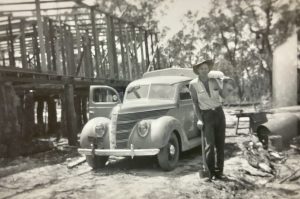
In telling us this story he also revealed he had to cut all the piers out of the bush and carried them in himself – no power just hand tools – no power – no running water – no sewerage. He was grateful that there was a spring on the land where he could get water. Once he did establish his gardens he would then have to carry and hand-water all the vegetables.
During this time Michael was at school on a legacy scholarship and would come to visit he and Helen on holidays – he remembers Michael on one of his visits taking some great photos – however later discovering he didn’t have any film in his camera. Happily, though we do have some images that recall that time. []
Dad worked hard and struggled to make a go of it for 7 years – he recalls his first crop of peas – ‘at the front of the house I planted peas – I had friends come out and crawling on their hands and knees picking peas – we had no idea’. He spoke of his naivety in having to learn everything himself and recalls taking his first crop of cabbages to Mr. Orrick’s, a greengrocer in Gosford – all loosely sitting in the back of his ute – yes, he had learned to drive a car – Mr. Orrick’s took one look at the ute and couldn’t believe the cabbages weren’t boxed. He kindly took them anyway – Dad recalling once again his naivety. Even so I’m sure his father Bill would have admired Jack’s enterprise. Dad did have many stories about his seven years at Ardlair – and so many of them involved the support and hard work of his community including the time Eddie – my grandfather planted 200 lemon trees for Dad and another time Eddie’s brother Cliff came to help him level the land with horses and a plough.
During the time at Ardlair, Pammy – who had known Dad since childhood came to visit with him often. He remembers planting orange trees with her and when I asked him if they were together, he said, well sort of. From what we know we believe at this time she wanted to go beyond friendship. Dad said he wasn’t quite ready despite having deep affection for her. 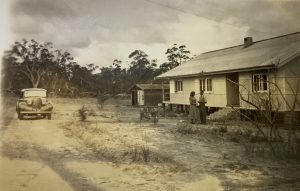
She travelled overseas and for approximately 5 years had little contact with him. He would go on to say years later that this decision was one of his greatest regrets of his life and in spite of their, some, 60 odd years together still regretted losing 5 years he could have had with my mother.
After some years apart Pammy and Jack reconnected, and she wrote on the 26th of December in 1954, a short missive on a small piece of card:
It is probably quite unnecessary to tell you something of which you are aware – but I felt I had to say how very happy our conversation this morning has made me. I used to think a great deal about “us” when I was abroad and always felt rather sad about our estrangement which seemed to exist. However, I couldn’t feel happier about things now, and have a deep gratitude for the friendship which still exists and can never be disrupted by details.
I’m happy to say that this friendship certainly seemed to have gone to the next level by the time Dad wrote this from Ardlair on the 8th of August 1955.
What is more appropriate than to say hello my beloved you are the only one for me. Just want to be with you and share every minute of every day. … Pammy dearest want to see you and talk with you for hours on end. Next week will be wonderful because we will be able to share everything, the trees, the sunshine, all those things that are there for us, the beauty of it all, your home, just everything. Life is wonderful even if it is rather bewildering. How was the concert? Hope you missed me. Its fortunate we are busy helping pass the time. All my love every bit of it from your Jack.
And as Dad would describe to me of this time in his concise and practical way – we knew it was on. And it was on – as they were married promptly on the 30th of September 1955 at St Andrews Church Chatswood.
Leading up to Mum and Dad getting married Dad shared: After selling Ardlair I got a job as an invoice clerk in Sydney working for Better Brakes – Pammy was living in a one room flat in Neutral Bay – no water just a gas ring – communal shower and toilet – we didn’t do what you fellas do – I went and stayed across the way with some friends – I ate there (with Pammy) but didn’t sleep there.
After they were married, for a time Pammy and Jack lived at Collaroy right on the beach at Pam’s Grandmothers house – grandma Thompson. Then they moved up the hill at Collaroy and then later across the road to a unit. They stayed in Sydney from 55 to 59.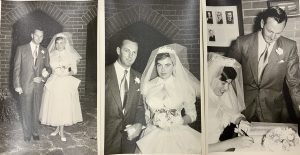
On the 9th April 1956 he joined AMP. After about a year in Sydney Dad had a promotion and was made a Superintendent and came to live in Canberra. That was the big move as he called it. Curiously it was his last big move geographically speaking, until selling the house in Canberra some 60 years later and moving to Goodwin in Ainslie after Pammy died in 2010. They had lived 60 years at 14 Greenway St Turner.
Our life as a family in Canberra had its ups and downs like any family. My memories of him growing up are not always streamline as was the case for many men of his era – his work ethic and desire to keep his family fed and safe would mean he would often work all day and into the evening and was not always able to be present. Ours was not a smooth relationship however whatever tensions we had in my formative years were most certainly resolved in his later years.
It can be said of Jack that he was loved, trusted and highly regarded by his family and his community. Whatever pursuit he put his mind to be it: Life Insurance, golf, pruning the apple trees, his faith, building Anna and I the safest most robust tree-house in the southern hemisphere [image] , being a reader at his church, being a companion to Pammy or a good friend to those he held closely; he was always true, loyal and steady.
One of his endearing characteristics that expresses trust and loyalty is how he related to someone providing him a service be it buying watches or clocks (which he loved), cars, suits, shoes, haircuts, camera supplies, denture repairs or golf clubs – if he trusted you, then you had a loyal customer for life. He would say to me: ‘stick with who you know – give trust and you’ll get it back’. An indelible signature of his values.
Another saying which I loved for its pun value as much as its integrity was “honesty is the best policy”. A value I do try to live up to today.
Dad expressed his love and service through everything he did especially his love and devotion to my mother and of course in his constancy to Anna and I – who were not always the easiest or most obedient – I’m still working on that.
Two days before he passed away, I asked him if he has any concerns he wanted to share. At first, he said – not really. But then he thought about it for a bit and said to make sure his tax return went in on the thirtieth of June.
A little later I asked him to share his favourite prayer. It was two verses from Proverbs 3 Verses 5 and 6:
(5) Trust in the Lord with all thine heart; and lean not into thine own understanding.
(6) In all thy ways acknowledge him, and he shall direct thy paths.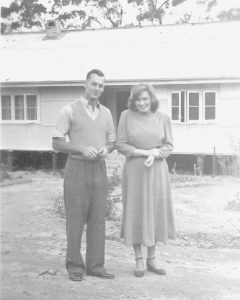
Well Dad – I’m sure he’s directing your path now. As you are directing us through the influence you’ve had on all of our lives. Your children, your family and your friends your colleagues, your clients and most recently your beloved carers.
The values of authenticity, loyalty, trustworthiness, thoroughness and reliability are your legacy every day every one of us lives them out. Perhaps we can say on this earth as it is in heaven.
Dad you were loved – you are loved, and you gave love – as Pammy would often say to us all –
Love is all there is.
MC 27th June 2019
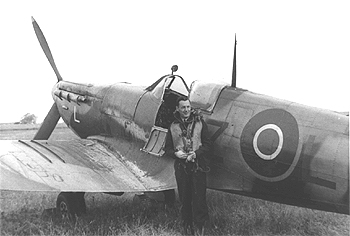
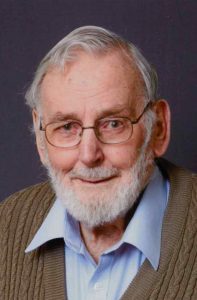
Martin, this is wonderful tribute to your dad. My father passed away in June but he didn’t follow the same code of conduct of your dad. He died a bitter and angry man. And that memory is seared onto my soul. It would be great to sit down for a chat one day. Over a Pale Ale, of course, mark
Thank you Mark for your kind reflection – I’m sorry to hear of your experience and can only imagine how challenging that must be – would love to see you again and yes definitely over a pale ale or three. Bless you mate.
Hi Martin, that was a lovely read. Your father was an amazing person. I often think of him, with happy memories. He became a member of our family and was an honour to have him celebrate Christmas with my family. Meeting people like Jack is the best part of my nursing. Best wishes to you and your family
Sharyn Bashfield
Bless you Sharyn. Your words are very kind and powerful. His spirit is alive in us all. With love – Martin